人教版八年级下册Unit 8 Have you read Treasure Island yet 第2课时 Section A(3a-3c) 课件(共27张PPT)
文档属性
| 名称 | 人教版八年级下册Unit 8 Have you read Treasure Island yet 第2课时 Section A(3a-3c) 课件(共27张PPT) |
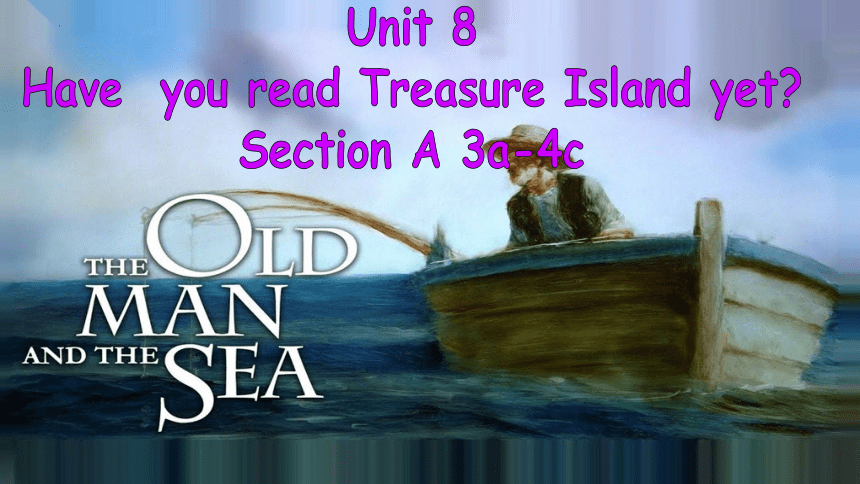
|
|
| 格式 | pptx | ||
| 文件大小 | 35.9MB | ||
| 资源类型 | 教案 | ||
| 版本资源 | 人教新目标(Go for it)版 | ||
| 科目 | 英语 | ||
| 更新时间 | 2025-05-16 00:00:00 | ||
图片预览

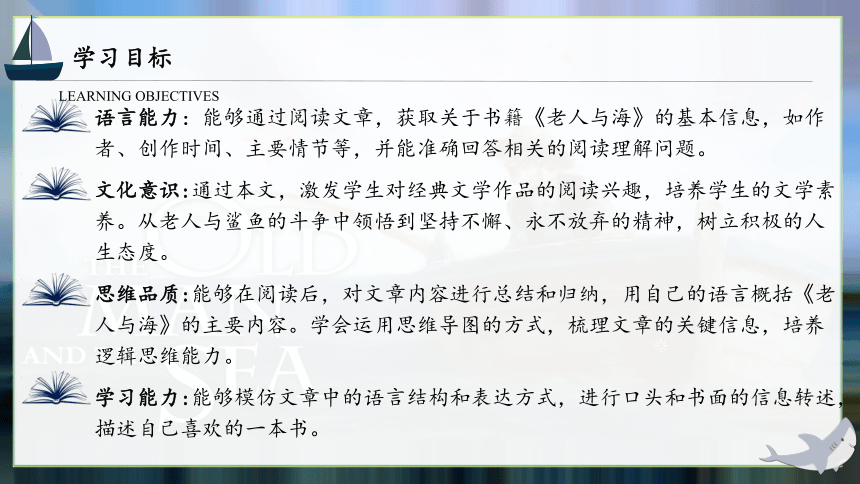
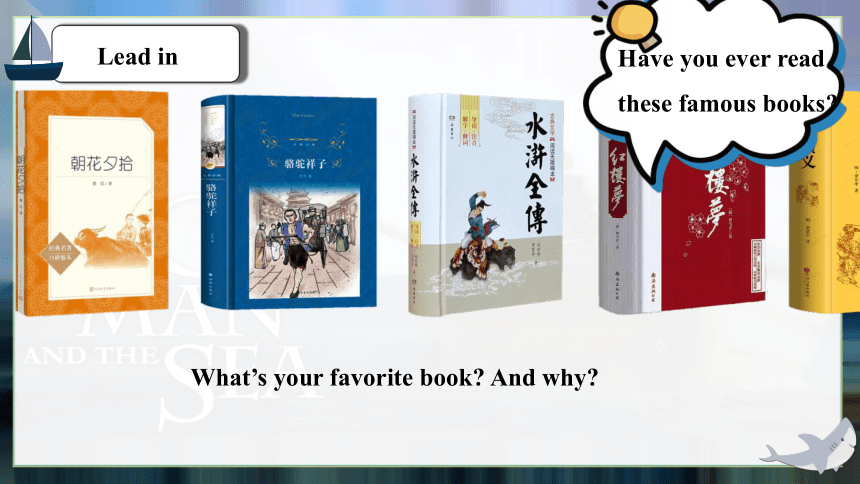
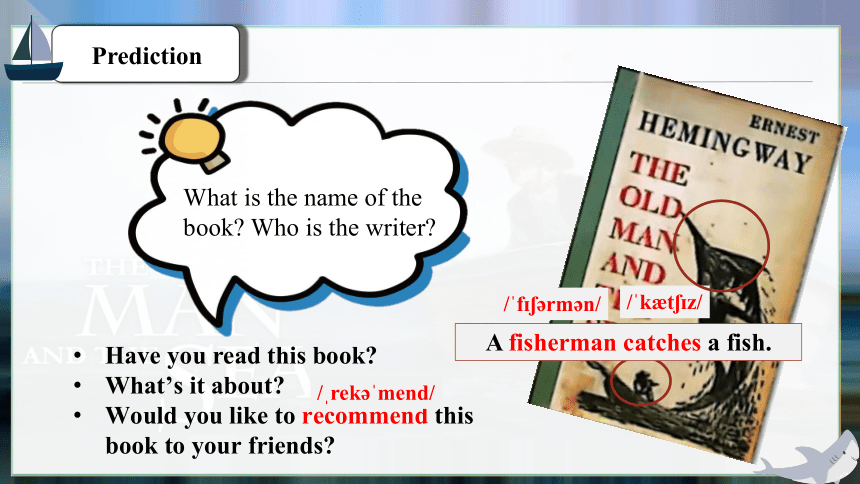
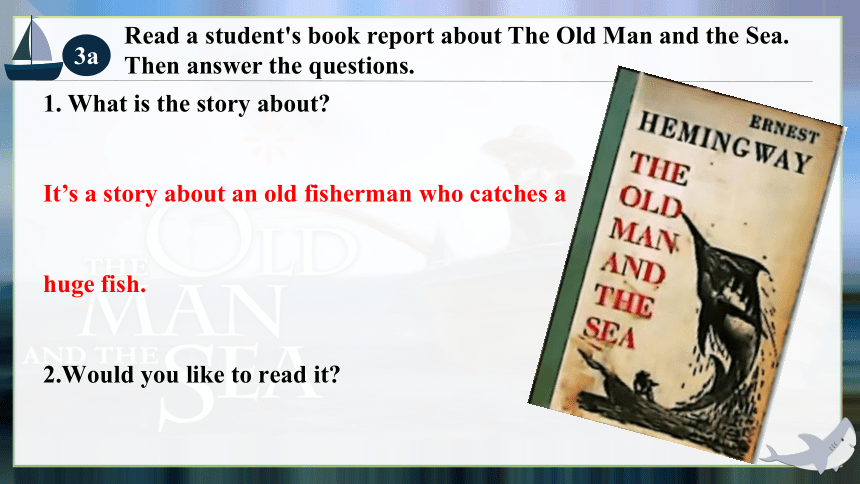
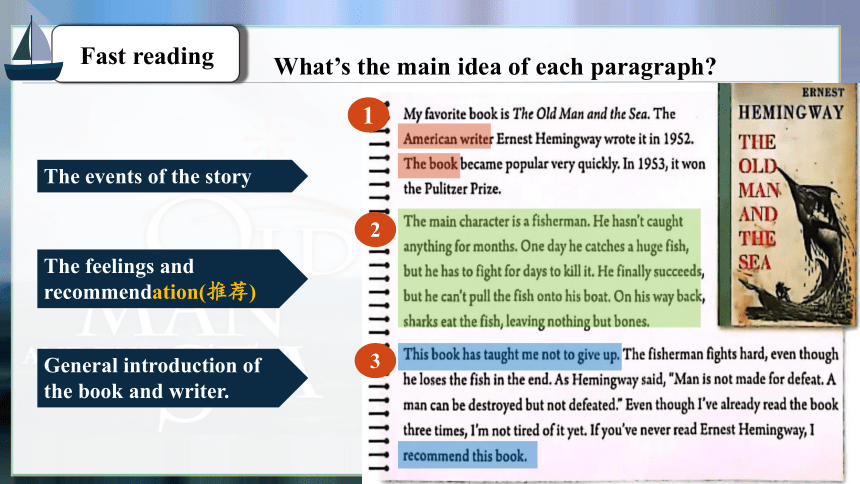

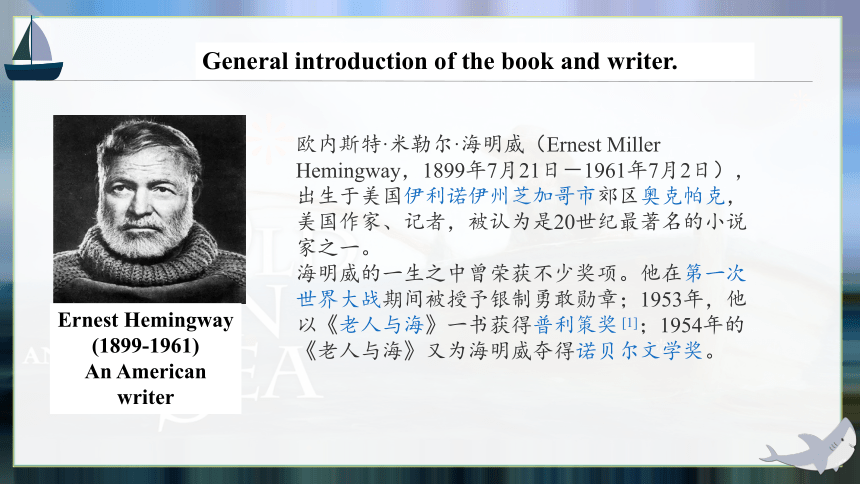
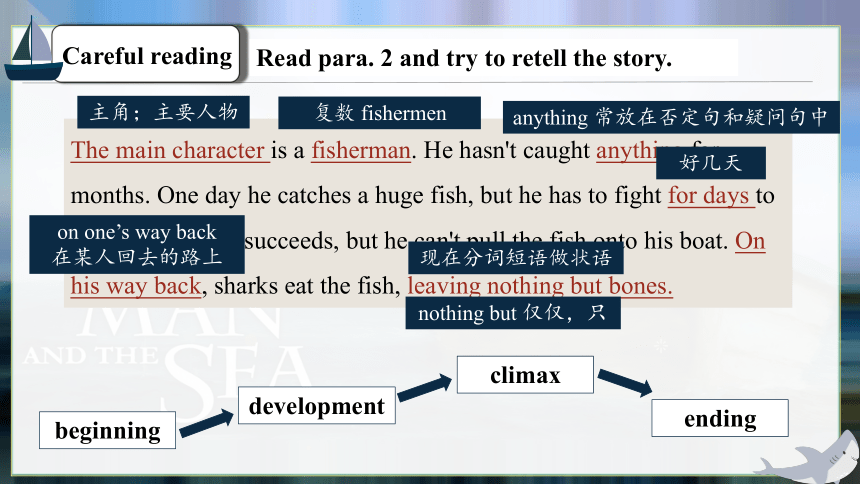
文档简介
(共27张PPT)
Unit 8
Have you read Treasure Island yet
Section A 3a-4c
语言能力:能够通过阅读文章,获取关于书籍《老人与海》的基本信息,如作者、创作时间、主要情节等,并能准确回答相关的阅读理解问题。
文化意识:通过本文,激发学生对经典文学作品的阅读兴趣,培养学生的文学素养。从老人与鲨鱼的斗争中领悟到坚持不懈、永不放弃的精神,树立积极的人生态度。
思维品质:能够在阅读后,对文章内容进行总结和归纳,用自己的语言概括《老人与海》的主要内容。学会运用思维导图的方式,梳理文章的关键信息,培养逻辑思维能力。
学习能力:能够模仿文章中的语言结构和表达方式,进行口头和书面的信息转述,描述自己喜欢的一本书。
学习目标
learning objectives
What’s your favorite book And why
Lead in
Have you ever read these famous books
Prediction
What is the name of the book Who is the writer
Have you read this book
What’s it about
Would you like to recommend this book to your friends
A fisherman catches a fish.
/ f rm n/
/ k t z/
/ rek mend/
Read a student's book report about The Old Man and the Sea. Then answer the questions.
3a
1. What is the story about
It’s a story about an old fisherman who catches a huge fish.
2.Would you like to read it
1
2
3
General introduction of the book and writer.
The events of the story
Fast reading
The feelings and recommendation(推荐)
What’s the main idea of each paragraph
Careful reading
My favorite book is The Old Man and the Sea. The American writer Ernest Hemingway wrote it in 1952.The book became popular very quickly. In 1953, it won the Pulitzer Prize.
普利策奖
Book title: . Writer When the writer wrote it
Prize Main character
the Old Man and the Sea
Ernest Hemingway
In 1952
the Pulitzer Prize(1953)
Read Para.1 and complete the chart.
become + adj./n. 变得…
Ernest Hemingway
(1899-1961)
An American writer
General introduction of the book and writer.
欧内斯特·米勒尔·海明威(Ernest Miller Hemingway,1899年7月21日-1961年7月2日),出生于美国伊利诺伊州芝加哥市郊区奥克帕克,美国作家、记者,被认为是20世纪最著名的小说家之一。
海明威的一生之中曾荣获不少奖项。他在第一次世界大战期间被授予银制勇敢勋章;1953年,他以《老人与海》一书获得普利策奖 [1];1954年的《老人与海》又为海明威夺得诺贝尔文学奖。
The main character is a fisherman. He hasn't caught anything for months. One day he catches a huge fish, but he has to fight for days to kill it. He finally succeeds, but he can't pull the fish onto his boat. On his way back, sharks eat the fish, leaving nothing but bones.
Read para. 2 and try to retell the story.
Careful reading
on one’s way back
在某人回去的路上
现在分词短语做状语
nothing but 仅仅,只
anything 常放在否定句和疑问句中
主角;主要人物
复数 fishermen
好几天
beginning
development
climax
ending
Events in the story
The fisherman
anything for months
hasn’t caught
Careful reading
Beginning
Events in the story
One day he
a huge fish, but he has to
catches
Careful reading
Development
fight for days
to kill it.
He finally
succeeds,
but he can’t
pull
the fish his boat
onto
Events in the story
On his way back,
want to eat the fish, so the old man has to them.
sharks
Careful reading
Climax
fight with
Events in the story
Sharks eat the fish, leaving
nothing but
Careful reading
Ending
bones.
sea
sharks
The old man
The fish
A place where risks and chances coexist(并存)
What do they stand for
A brave tough guy
The dreams
difficulties
Free talk
Do you think the old man is successful
Even though the old man defeats(击败) the sharks, he loses his fish in the end.
A successful loser
A failed hero
一个胜利的失败者
一个失败了的英雄
This book has taught me not to give up. The fisherman fights hard, even though he loses the fish in the end. As Hemingway said, “Man is not made for defeat. A man can be destroyed but not defeated." Even though I've already read the book three times, I'm not tired of it yet. If you've never read Ernest Hemingway, I recommend this book.
Careful reading
Read Para.3 and complete the chart.
Book title: . What the student has learnt
the Old Man and the Sea
This book has taught him not to give up.
Man is not made for defeat. A man can be destroyed but not defeated.
人不是为失败而生的
一个人可以被毁灭,但不能被打败。
teach sb. (not) to do sth.
教会某人(不)做某事
放弃
即使
最后
be tired of 对…厌倦
v.推荐
This book has taught me not to give up. The fisherman fights hard, even though he loses the fish in the end. As Hemingway said, “Man is not made for defeat. A man can be destroyed but not defeated." Even though I've already read the book three times, I'm not tired of it yet. If you've never read Ernest Hemingway, I recommend this book.
Careful reading
Read Para.3 and answer the questions.
Does the writer like the book How do you know that
Even though he has already read the book three times, he is not tired of it yet
即使他已经读了这本书三遍,他也还不厌倦。
Summary
General introduction of the book and writer.
The events of the story
The feelings and recommendation
Writer:
Time:
Prize:
Beginning:
Development :
Climax:
Ending :
This book has taught me not to .
I've already read the book three times, I'm not it yet.
If you've never read Ernest Hemingway, I this book.
Ernest Hemingway
In 1952
The Pulitzer prize
Hasn’t caught anything for months
catches a huge fish, has to fight for days to kill it.
Fights with sharks
sharks eat the fish, leaving nothing but bones
give up.
Even though
tired of
recommend
Can you share your favorite book with us
Mention the title of the book and the author.
Introduction
Main body
Conclusion
Briefly introduce the events of the book.
Share what you have learned from the book or why you like it.
Let’s talk
Introduction
The events of the story
Conclusion
My favorite book is…, …wrote it in….
It won…
The main character is…
He/She tries his/her best to…
In the end/ Finally,…
The book has taught me…/has reminded me that…
Even though I’ve already read the book…times, I’m not tired of it yet.
If you’ve never read…, I recommend this book.
catch v. “抓住、接住”
1. He hasn't caught anything for months.
1.“赶上、追上”
e.g. Hurry up, or we won't catch the bus.
(快点,否则我们赶不上公交车了。)
2.表示“染上(疾病)”
e.g. She caught a cold last week.
(她上周感冒了。)
3.表示“理解、领会”
e.g. I didn't catch what you said.
(我没听懂你说的话。)
e.g. Catch the ball!(接住球!)
catch 的其他常见意思:
catch up:赶上;追上;
e.g. You go first, I'll catch up later.(你先走,我稍后赶上。)
2.catch on:理解;明白;流行起来。
e.g. It took me a while to catch on to what he was saying.(我过了一会儿才明白他在说什么。)
3.catch out:发现……有错误(或做坏事)。
catch 的常见短语:
区别defeat与win
1. A man can be destroyed but not defeated.
一个人可以被毁灭,但不能被打败。
主要用于指在竞争、比赛、战斗、辩论等中战胜对手,使其无法达到目标或取得成功
defeat v.“击败,战胜”
defeat win
强调战胜对手 强调自身获得胜利
及物动词,后接对手 作及物动词时接比赛,奖项等
The champion defeated all the challengers.(冠军击败了所有挑战者。) She won the first prize in the competition.(她在比赛中赢得了一等奖。)
Summary
General introduction of the book and writer.
The events of the story
The feelings and recommendation
Writer:
Time:
Prize:
Beginning:
Development :
Climax:
Ending :
This book has taught me not to .
I've already read the book three times, I'm not it yet.
If you've never read Ernest Hemingway, I this book.
Ernest Hemingway
In 1952
The Pulitzer prize
Hasn’t caught anything for months
catches a huge fish, has to fight for days to kill it.
Fights with sharks
sharks eat the fish, leaving nothing but bones
give up.
Even though
tired of
recommend
1.—Did you ________ the soccer match yesterday
—Yes, we ________ the strongest team in our school at last.
A.defeat; won B.win; defeated C.win; hit D.defeat; lost
2.Whenever I face challenges, my mother always encourages me not ________.
A.to give up B.to give away C.give up D.give away
3.I didn’t write down every sentence, but I still tried hard ________ what he said.
A.catching B.to catch C.catch D.caught
一、单选
B
A
B
1.He hasn't (catch) anything for months.
2.This book has (teach) me not to give up.
3.Even though I‘ve already (read)the book three times, I'm not tired of it yet.
4.The book (become) popular very quickly
二. 用所给词的正确形式填空。
caught
taught
read
became
Homework
Write a short passage about your favorite book (At least 80 words).
You can follow the structure below:
Mention the title of the book and the author.
Introduction
Main body
Conclusion
Briefly introduce the plot of the book.
Share what you have learned from the book or why you like it.
Unit 8
Have you read Treasure Island yet
Section A 3a-4c
语言能力:能够通过阅读文章,获取关于书籍《老人与海》的基本信息,如作者、创作时间、主要情节等,并能准确回答相关的阅读理解问题。
文化意识:通过本文,激发学生对经典文学作品的阅读兴趣,培养学生的文学素养。从老人与鲨鱼的斗争中领悟到坚持不懈、永不放弃的精神,树立积极的人生态度。
思维品质:能够在阅读后,对文章内容进行总结和归纳,用自己的语言概括《老人与海》的主要内容。学会运用思维导图的方式,梳理文章的关键信息,培养逻辑思维能力。
学习能力:能够模仿文章中的语言结构和表达方式,进行口头和书面的信息转述,描述自己喜欢的一本书。
学习目标
learning objectives
What’s your favorite book And why
Lead in
Have you ever read these famous books
Prediction
What is the name of the book Who is the writer
Have you read this book
What’s it about
Would you like to recommend this book to your friends
A fisherman catches a fish.
/ f rm n/
/ k t z/
/ rek mend/
Read a student's book report about The Old Man and the Sea. Then answer the questions.
3a
1. What is the story about
It’s a story about an old fisherman who catches a huge fish.
2.Would you like to read it
1
2
3
General introduction of the book and writer.
The events of the story
Fast reading
The feelings and recommendation(推荐)
What’s the main idea of each paragraph
Careful reading
My favorite book is The Old Man and the Sea. The American writer Ernest Hemingway wrote it in 1952.The book became popular very quickly. In 1953, it won the Pulitzer Prize.
普利策奖
Book title: . Writer When the writer wrote it
Prize Main character
the Old Man and the Sea
Ernest Hemingway
In 1952
the Pulitzer Prize(1953)
Read Para.1 and complete the chart.
become + adj./n. 变得…
Ernest Hemingway
(1899-1961)
An American writer
General introduction of the book and writer.
欧内斯特·米勒尔·海明威(Ernest Miller Hemingway,1899年7月21日-1961年7月2日),出生于美国伊利诺伊州芝加哥市郊区奥克帕克,美国作家、记者,被认为是20世纪最著名的小说家之一。
海明威的一生之中曾荣获不少奖项。他在第一次世界大战期间被授予银制勇敢勋章;1953年,他以《老人与海》一书获得普利策奖 [1];1954年的《老人与海》又为海明威夺得诺贝尔文学奖。
The main character is a fisherman. He hasn't caught anything for months. One day he catches a huge fish, but he has to fight for days to kill it. He finally succeeds, but he can't pull the fish onto his boat. On his way back, sharks eat the fish, leaving nothing but bones.
Read para. 2 and try to retell the story.
Careful reading
on one’s way back
在某人回去的路上
现在分词短语做状语
nothing but 仅仅,只
anything 常放在否定句和疑问句中
主角;主要人物
复数 fishermen
好几天
beginning
development
climax
ending
Events in the story
The fisherman
anything for months
hasn’t caught
Careful reading
Beginning
Events in the story
One day he
a huge fish, but he has to
catches
Careful reading
Development
fight for days
to kill it.
He finally
succeeds,
but he can’t
pull
the fish his boat
onto
Events in the story
On his way back,
want to eat the fish, so the old man has to them.
sharks
Careful reading
Climax
fight with
Events in the story
Sharks eat the fish, leaving
nothing but
Careful reading
Ending
bones.
sea
sharks
The old man
The fish
A place where risks and chances coexist(并存)
What do they stand for
A brave tough guy
The dreams
difficulties
Free talk
Do you think the old man is successful
Even though the old man defeats(击败) the sharks, he loses his fish in the end.
A successful loser
A failed hero
一个胜利的失败者
一个失败了的英雄
This book has taught me not to give up. The fisherman fights hard, even though he loses the fish in the end. As Hemingway said, “Man is not made for defeat. A man can be destroyed but not defeated." Even though I've already read the book three times, I'm not tired of it yet. If you've never read Ernest Hemingway, I recommend this book.
Careful reading
Read Para.3 and complete the chart.
Book title: . What the student has learnt
the Old Man and the Sea
This book has taught him not to give up.
Man is not made for defeat. A man can be destroyed but not defeated.
人不是为失败而生的
一个人可以被毁灭,但不能被打败。
teach sb. (not) to do sth.
教会某人(不)做某事
放弃
即使
最后
be tired of 对…厌倦
v.推荐
This book has taught me not to give up. The fisherman fights hard, even though he loses the fish in the end. As Hemingway said, “Man is not made for defeat. A man can be destroyed but not defeated." Even though I've already read the book three times, I'm not tired of it yet. If you've never read Ernest Hemingway, I recommend this book.
Careful reading
Read Para.3 and answer the questions.
Does the writer like the book How do you know that
Even though he has already read the book three times, he is not tired of it yet
即使他已经读了这本书三遍,他也还不厌倦。
Summary
General introduction of the book and writer.
The events of the story
The feelings and recommendation
Writer:
Time:
Prize:
Beginning:
Development :
Climax:
Ending :
This book has taught me not to .
I've already read the book three times, I'm not it yet.
If you've never read Ernest Hemingway, I this book.
Ernest Hemingway
In 1952
The Pulitzer prize
Hasn’t caught anything for months
catches a huge fish, has to fight for days to kill it.
Fights with sharks
sharks eat the fish, leaving nothing but bones
give up.
Even though
tired of
recommend
Can you share your favorite book with us
Mention the title of the book and the author.
Introduction
Main body
Conclusion
Briefly introduce the events of the book.
Share what you have learned from the book or why you like it.
Let’s talk
Introduction
The events of the story
Conclusion
My favorite book is…, …wrote it in….
It won…
The main character is…
He/She tries his/her best to…
In the end/ Finally,…
The book has taught me…/has reminded me that…
Even though I’ve already read the book…times, I’m not tired of it yet.
If you’ve never read…, I recommend this book.
catch v. “抓住、接住”
1. He hasn't caught anything for months.
1.“赶上、追上”
e.g. Hurry up, or we won't catch the bus.
(快点,否则我们赶不上公交车了。)
2.表示“染上(疾病)”
e.g. She caught a cold last week.
(她上周感冒了。)
3.表示“理解、领会”
e.g. I didn't catch what you said.
(我没听懂你说的话。)
e.g. Catch the ball!(接住球!)
catch 的其他常见意思:
catch up:赶上;追上;
e.g. You go first, I'll catch up later.(你先走,我稍后赶上。)
2.catch on:理解;明白;流行起来。
e.g. It took me a while to catch on to what he was saying.(我过了一会儿才明白他在说什么。)
3.catch out:发现……有错误(或做坏事)。
catch 的常见短语:
区别defeat与win
1. A man can be destroyed but not defeated.
一个人可以被毁灭,但不能被打败。
主要用于指在竞争、比赛、战斗、辩论等中战胜对手,使其无法达到目标或取得成功
defeat v.“击败,战胜”
defeat win
强调战胜对手 强调自身获得胜利
及物动词,后接对手 作及物动词时接比赛,奖项等
The champion defeated all the challengers.(冠军击败了所有挑战者。) She won the first prize in the competition.(她在比赛中赢得了一等奖。)
Summary
General introduction of the book and writer.
The events of the story
The feelings and recommendation
Writer:
Time:
Prize:
Beginning:
Development :
Climax:
Ending :
This book has taught me not to .
I've already read the book three times, I'm not it yet.
If you've never read Ernest Hemingway, I this book.
Ernest Hemingway
In 1952
The Pulitzer prize
Hasn’t caught anything for months
catches a huge fish, has to fight for days to kill it.
Fights with sharks
sharks eat the fish, leaving nothing but bones
give up.
Even though
tired of
recommend
1.—Did you ________ the soccer match yesterday
—Yes, we ________ the strongest team in our school at last.
A.defeat; won B.win; defeated C.win; hit D.defeat; lost
2.Whenever I face challenges, my mother always encourages me not ________.
A.to give up B.to give away C.give up D.give away
3.I didn’t write down every sentence, but I still tried hard ________ what he said.
A.catching B.to catch C.catch D.caught
一、单选
B
A
B
1.He hasn't (catch) anything for months.
2.This book has (teach) me not to give up.
3.Even though I‘ve already (read)the book three times, I'm not tired of it yet.
4.The book (become) popular very quickly
二. 用所给词的正确形式填空。
caught
taught
read
became
Homework
Write a short passage about your favorite book (At least 80 words).
You can follow the structure below:
Mention the title of the book and the author.
Introduction
Main body
Conclusion
Briefly introduce the plot of the book.
Share what you have learned from the book or why you like it.
同课章节目录
- Unit 1 What's the matter?
- Section A
- Section B
- Unit 2 I'll help to clean up the city parks.
- Section A
- Section B
- Unit 3 Could you please clean your room?
- Section A
- Section B
- Unit 4 Why don't you talk to your parents?
- Section A
- Section B
- Unit 5 What were you doing when the rainstorm came
- Section A
- Section B
- Review of Units 1-5
- Unit 6 An old man tried to move the mountains.
- Section A
- Section B
- Unit 7 What's the highest mountain in the world?
- Section A
- Section B
- Unit 8 Have you read Treasure Island yet?
- Section A
- Section B
- Unit 9 Have you ever been to a museum?
- Section A
- Section B
- Unit 10 I've had this bike for three years.
- Section A
- Section B
